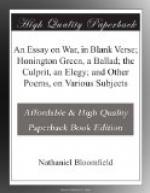When at the dread Confessional,
Men trembled from their early
youth,
Taught to fear, on pain of Hell,
To utter more or less than
Truth.
Then Faith could sharpest trials stand,
Man at threat’ning Death
could smile,
If but his Pastor’s lenient hand
Toucht him with the Holy Oil.
Full faith the solemn Oath obtain’d,
Man’s mind was aw’d
by priestly rule;
Steady to Truth he still remain’d,
Unless to priestly fraud a
tool.
But where Church Discipline has ceas’d
To train men’s minds
in early youth,
Hard indeed the Culprit’s case,
Whose fate depends on others’
truth.
Even the man whose ways are wise,
Whose life is rul’d
by Honour’s laws;
Who owns, in philosophic guise,
A Deity ... a first great
cause: ...
Yet boasts his mind no shackles wears:
...
’Tis hard his solemn
Oath to trust;
For, without future hopes and fears,
Know I if Conscience makes
him just? ...
And then, the’ admitted evidence
...
Ye Jurors, can his word be
true?
Tempted, in his own defence,
To feign another’s crime
to you.
When venial crimes in Love’s gay
spring,
Prompt the youthful Female’s
sigh;
When her roses all take wing,
And Matrons sage her plight
descry;
Blushing, weeping, she’ll confess
The fault her faded cheeks
discover:
But, to make her crime the less,
Imputes an outrage to her
Lover.
So strong the power of pride and shame,
Her frailty she will still
deny;
Rather than own herself to blame,
She lets the hapless Lover
die.
Is Merit from his right debarr’d;
Or guiltless charg’d
with foul offence?
A Knave but speaks the perjur’d
word,
And laughs at injur’d
Innocence.
Laughs he at detection too?
Yes ... for he’ll be
but expos’d;
But set up to public view,
Should his falshood be disclos’d.
He such exposure dares defy,
Public shame is not his fear;
He who can vouch the solemn lie,
Would shew his forehead any
where.
While Innocence meets punishment,
While Falshood can produce
such woes,
Mercy’s self must needs lament
Perjury not more punish’d
goes.
Dubious may be the Culprit’s case,
Though clear and open all
his ways;
What Life is proof ’gainst dire
disgrace,
If guileful hate his act pourtrays?
Ye Jurors cautiously proceed,
When the question’s
left to you,
Not ‘Has the Culprit done the deed?’
But ’Was the deed a
crime to do?’[10]
Grudge not deliberation’s time,
Lest you should be too severe;
When Justice must believe a crime,
She lends it her most tardy
ear.
How short is this momentous hour!
O! how swift the minutes fly!
Soon the Jurors, arm’d with power,
Will come to bid me live or
die.




